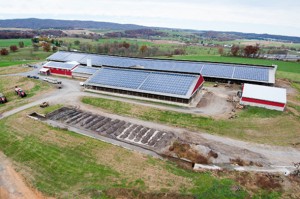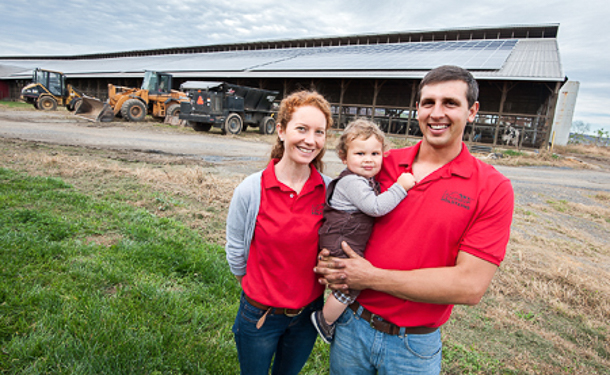For more than five decades, the Yutzy family has produced milk, corn and small grains at Windcrest Holsteins.
Next week, the dairy farm will start producing a new commodity — electricity.
The south-facing roofs of the farm’s free-stall barn and milking parlor have been covered with 1,798 solar panels expected to generate 707,139 kilowatt hours of electricity a year. Thanks largely to a grant, tax credits and depreciation allowances, the $1.3 million system is projected to pay for itself in less than five years and eliminate the farm’s power bill.
Dave Yutzy, who owns Windcrest with his wife, Jewel, said the installation sends a positive message to the community about his farm and about dairy operations in general. [Dave, his wife Jewel, and their two sons, Ben and Aaron, as well as Aaron’s wife Andrea Bowman, are all Eastern Mennonite University graduates.]
He’d considered dairy digesters, which convert manure into methane gas, as a renewable-energy source. His wife once mentioned a wind turbine over breakfast, but that idea never left the kitchen.
Though the project’s eco-friendly aspects are appealing, Yutzy said the numbers delivered to him by Pennsylvania-based Paradise Energy Solutions powered his decision to convert to solar. After all, his summer electric bills often top $6,000.
“[Paradise representatives] did a very good job at presenting payback calculations,” he said.
“When you looked at the payback on this system, it looked like it would be below five years, which I consider an excellent investment. …
“More than anything, it was a good business decision.”
Converted skeptic
Yutzy was aware that some American farmers had gone solar when Paradise consultant Greg Yost pulled into his farm earlier this year. He’d seen the systems elsewhere and knew “solar was hot” in Pennsylvania several years back because of state incentives.
But Virginia didn’t offer incentives, so he didn’t think it was fiscally viable.
The thought that the farm might have a solar future, however, was factored into decisions he made five years ago, when new barns were built atop a hill just east of Timberville. The structures were positioned east-west to provide access to sunlight from the south.
Even after hearing Yost’s initial pitch, the 55-year-old Rockingham County native wasn’t sold.
“At that point, I really didn’t believe we would do it,” Yutzy said. “I was very skeptical at first.”
Solar energy has become a good investment for many businesses as solar module prices have fallen over the years, said Joe Sadonis, now Paradise’s solar consultant for the area. Add in a federal tax credits offered through 2016 and the ability to depreciate the system over five years and a system often becomes a good deal.
“When you invest in solar,” he said, “it’s similar to purchasing your house rather than renting your house.”
A veteran dairyman, Yutzy said looked into other solar companies but said trusted the “very conservative numbers” Paradise provided.
The deal became even sweeter when Windcrest received a $317,500 Rural Energy for America Program grant for the project from the U.S. Department of Agriculture.
“We were not guaranteed the REAP grant,” Yutzy said, “but we tried very hard to get that and were successful. Even without the REAP grant, we were committed to go ahead.”
Farm focus
While it serves other clients, Sadonis said Paradise Energy Solutions has focused on agricultural clients because the industry is in the company’s roots. Brothers Matt, Marcus, Tim and Jason Beiler, who were raised on a farm, started the company in 2009 in Gap, Pa., a village in eastern Lancaster County.
Ron Osti-Helsley, project manager for the Windcrest Holsteins job, said the company’s first project was at Hope Valley Farms, a dairy operation in New Holland, Pa., and business has grown since then.

The 557.38-kilowatt system puts the electricity it generates onto the electric grid, and Windcrest pulls energy from the grid as it always has. As long as the farm generates more than it consumes each year, the Yutzys won’t be billed for electricity; if they do owe, Paradise will pay the bill because it guaranteed the family that the system would eliminate the cost.
The Yutzys won’t be paid for any excess electricity the farm provides because Virginia law doesn’t allow such payments.
Osti-Helsley said solar power could yield savings for farmers who owe taxes at the end of the year.
“If you have tax liability and you’re not looking at solar,” he said, “you’re uninformed.”
The solar panels have a 25-year warranty. The system’s inverters, which transform direct current to the alternating current that power homes and businesses, have a 10-year warranty.
The system, Paradise officials have said, is Virginia’s largest privately owned solar installation and will save the Yutzy’s the more than $40,000 a year they spend on electricity. Adding that to the REAP grant, tax credits and depreciation puts Yutzy in the black in five years.
Renewables not common
Solar power is used to provide electricity to remote sections of farms around Virginia, but large-scale renewable-energy use isn’t common.
Sandy Adams, commissioner of the Virginia Department of Agriculture and Consumer Services, and Eric Paulson, executive secretary of the Virginia State Dairymen’s Association, said a few dairy digesters are used in the state, but neither was aware of any large solar arrays. If it makes fiscal sense, however, they could see other producers making the solar switch.
“Farmers have definitely been looking at it. It’s something they’re aware of and interested in,” Paulson said. “But they want to see it in real life. I think the biggest thing is when they can have a great learning experience from other producers.”
Last year, Virginia’s Department of Mines, Minerals and Energy commissioned a report on potential solar energy use in rural areas. The state doesn’t offer renewable-energy incentives, but it does encourage their use.
“We would support the use of renewable resources,” said Adams, “especially when it helps producers cut costs and increase profit margins.”
Switching for good
Though his cows won’t know the difference, the Yutzys farm is slated to switch over to solar power for good next week.
Yutzy grew up working on the farm, and it’s been his livelihood since he graduated from Eastern Mennonite University in 1982. Back then, he said, the operation milked a herd of about 120.
Windcrest Holsteins now milks 840 cows, employing 15 people for its round-the-clock operation in addition to the four family members who work there. The group includes sons Ben, the farm’s herdsman, and Aaron, the feed and crop manager.
The herd, Yutzy said, produces about 5,600 gallons of milk every 17 hours. The farm is a member of the Dairy Farmers of America cooperative.
Yutzy said he plans to add another barn at the farm for heifer space. It won’t require much electricity, but he’s gotten a proposal from Paradise to put an array on its roof.
Eliminating the farm’s electric expense is the major reason for the solar project, but Yutzy said he sees other benefits. The family likes having people visit to educate them about agriculture, and the solar array increases interest.
“We are always looking for ways to be a positive influence in the community,” he said. “This solar array has, and I’m sure it will continue to be, a talking point for people, or a reason for them to come to the farm, and we’ll be able to talk to them about dairy.
“The next generation (of Yutzys), too, is very much on board with this. They felt this was a very good thing for the farm to do.”
Reprinted with permission from the Nov. 7, 2105 issue of the Daily News-Record.

Congrats on the move to solar! Hopefully you’ll be able to convert other skeptics and start a trend!
Great story! Cool to see two generations of alumni modeling EMU’s passion for sustainability and care for God’s creation. Jared is right, hopefully the Yutzy family will start a trend in Virginia.
Yutzy family: a true EMU phenomenon… good work